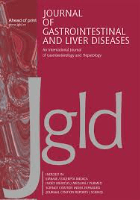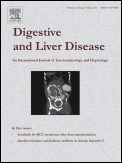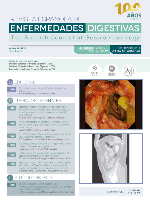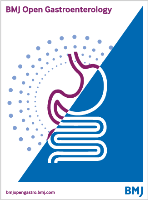
Journal of Gastrointestinal and Liver Diseases
Scope & Guideline
Exploring Innovations in Digestive Medicine
Introduction
Aims and Scopes
- Clinical Research in Gastrointestinal Disorders:
The journal publishes original research articles addressing various gastrointestinal disorders, including inflammatory bowel disease, celiac disease, and colorectal cancer, focusing on clinical outcomes, prevalence, and management strategies. - Hepatology and Liver Disease Studies:
Research on liver diseases, including hepatitis, cirrhosis, and hepatocellular carcinoma, is a core focus, with studies exploring novel therapies, biomarkers, and the impact of comorbidities on liver health. - Innovative Diagnostic and Therapeutic Techniques:
The journal emphasizes studies that introduce new diagnostic methods and therapeutic interventions, including endoscopic techniques, imaging advancements, and the use of artificial intelligence in gastroenterology. - Impact of Diet and Microbiota on Gastrointestinal Health:
Research exploring the relationship between diet, gut microbiota, and gastrointestinal health, including studies on probiotics, dietary interventions, and their effects on diseases like irritable bowel syndrome and fatty liver disease. - Public Health and Epidemiological Studies:
The journal includes studies on the epidemiology of gastrointestinal and liver diseases, assessing public health issues, screening programs, and the impact of socio-economic factors on disease prevalence.
Trending and Emerging
- COVID-19 Impact on Gastrointestinal Health:
Research addressing the implications of COVID-19 on gastrointestinal and liver diseases has surged, reflecting the pandemic's profound effects on patient management and disease outcomes. - Integration of Artificial Intelligence in Diagnosis:
There is an increasing interest in the application of artificial intelligence and machine learning in the diagnosis and management of gastrointestinal disorders, demonstrating the potential for technological advancements to improve clinical outcomes. - Microbiome Research and Gut Health:
Studies on the gut microbiome's role in health and disease are on the rise, particularly concerning inflammatory bowel diseases and metabolic disorders, highlighting the importance of microbiota in gastrointestinal health. - Personalized and Precision Medicine Approaches:
Emerging research focuses on personalized treatment strategies in gastroenterology, including genetic factors influencing disease susceptibility and treatment response, representing a shift towards individualized patient care. - Nutritional Interventions and Gut Health:
Research exploring the impact of dietary modifications and nutritional interventions on gastrointestinal health is gaining prominence, emphasizing the role of nutrition in disease management and prevention.
Declining or Waning
- Traditional Surgical Techniques:
There has been a noticeable decline in publications focusing on traditional surgical techniques for gastrointestinal disorders, as newer minimally invasive and endoscopic methods gain preference and are more frequently studied. - Single Disease Focus Studies:
Research solely focused on individual diseases without considering comorbidities or broader health impacts is less common, indicating a shift towards a more holistic approach in gastroenterology research. - Conventional Pharmacotherapy Studies:
Studies centered on conventional pharmacotherapy for gastrointestinal and liver diseases are becoming less prevalent, as there is a growing interest in personalized medicine and novel therapeutic agents. - Basic Science Research in Gastroenterology:
The journal has seen a decrease in basic science studies that do not directly translate to clinical applications, reflecting a trend toward more clinically relevant research. - Historical Reviews and Case Reports:
There is a diminishing focus on historical reviews and case reports, as the journal prioritizes original research and systematic reviews that contribute significantly to current clinical practice.
Similar Journals

Frontline Gastroenterology
Exploring the Depths of Digestive ScienceFrontline Gastroenterology is a leading academic journal published by the BMJ Publishing Group that plays a vital role in advancing the field of gastroenterology and hepatology. Established in 2013, this prestigious journal has established itself as a significant resource for researchers, healthcare professionals, and students alike, maintaining a commendable impact factor and consistently achieving a Q2 ranking in both gastroenterology and hepatology categories as of 2023. With its focus on disseminating high-quality, peer-reviewed research, Frontline Gastroenterology covers a wide scope of topics pertinent to the understanding, diagnosis, and treatment of gastrointestinal and liver diseases. Although it does not offer Open Access options, its content is accessible through various institutional and personal subscriptions, ensuring that critical findings reach an international audience. As the journal continues to converge into the future, it remains dedicated to fostering innovation and dialogue in gastroenterological sciences.

DIGESTIVE AND LIVER DISEASE
Exploring the frontiers of digestive and liver health.DIGESTIVE AND LIVER DISEASE is a prominent journal published by Elsevier Science Inc, dedicated to advancing the field of gastroenterology and hepatology. With an ISSN of 1590-8658 and an E-ISSN of 1878-3562, this journal has established itself as a significant resource within the academic community, especially considering its Q2 ranking in both gastroenterology and hepatology categories as of 2023. Spanning from 2000 to 2024, the journal presents a diverse array of peer-reviewed articles, clinical studies, and review papers that explore the latest advancements and research findings in digestive and liver diseases. The journal's robust impact, reflected in its Scopus rankings—40th out of 167 in gastroenterology and 28th out of 82 in hepatology—highlights its critical role in shaping practices and understanding in these vital areas of medicine. With open access options available, DIGESTIVE AND LIVER DISEASE aims to make high-quality research accessible to a wider audience, thereby encouraging collaboration and innovation. Researchers, healthcare professionals, and students alike will find valuable insights into the complex mechanisms, diagnostics, and therapeutic strategies pertinent to digestive and liver health.

GUT
Unveiling Insights in Gastroenterology Since 1960GUT is a premier journal in the field of gastroenterology, published by the esteemed BMJ Publishing Group. With a rich history dating back to 1960 and an impressive convergence of research expected to continue through 2024, GUT has established itself as a cornerstone of academic discourse in the gastrointestinal sciences. The journal boasts a remarkable impact factor, positioning it in the Q1 category for gastroenterology with an outstanding rank of #3 out of 167 in its Scopus ranking, reflecting its 98th percentile status among peers. Although it does not currently offer open access options, GUT remains dedicated to disseminating high-quality research, reviews, and clinical studies that advance the understanding of digestive health. Published in the United Kingdom, GUT serves as an essential resource for researchers, clinicians, and students aiming to stay at the forefront of innovations and developments in the field.

Indian Journal of Gastroenterology
Bridging Research and Practice in Gastrointestinal HealthThe Indian Journal of Gastroenterology, a prominent publication in the field of gastroenterology, is published by Springer India. With roots dating back to 1982 and an ongoing commitment to disseminating high-quality research, this journal serves as a vital platform for researchers, practitioners, and students interested in gastrointestinal health and diseases. It boasts an impressive track record with a Scopus rank of #82 in the gastroenterology category and a 2023 quartile ranking of Q3, firmly situating it within the competitive landscape of medical journals. Although it is not an open-access journal, the Indian Journal of Gastroenterology offers accessible research articles contributing significantly to the field, facilitating informed discussion and advancing knowledge in gastrointestinal medicine. The journal's comprehensive focus covers a wide range of topics from clinical studies to innovative therapeutic approaches, ensuring its relevance to current medical practices and the evolving challenges in gastroenterology.

WORLD JOURNAL OF GASTROENTEROLOGY
Transforming knowledge into practice in gastroenterology.WORLD JOURNAL OF GASTROENTEROLOGY, published by BAISHIDENG PUBLISHING GROUP INC, stands at the forefront of gastrointestinal research, providing a critical platform for the dissemination of high-quality studies in the field. With an impressive impact factor reflected in its Q1 rankings in both Gastroenterology and Miscellaneous Medicine, this journal is recognized for its rigorous peer-review process and commitment to advancing knowledge and practices related to digestive health. Covering comprehensive scopes from clinical advancements to innovative therapies, the journal serves an essential role for researchers, clinicians, and students, enabling them to stay updated on the latest developments and findings from 1998 through 2024. The open access model facilitates broader accessibility, ensuring that groundbreaking research reaches a global audience. The journal's ranking within the top 15% of Scopus demonstrates its significant contribution to the academic community, making it a valuable resource for advancing the science of gastroenterology.

Gastrointestinal Disorders
Unlocking Knowledge in Gastrointestinal Disorders for AllGastrointestinal Disorders is a prominent open-access journal published by MDPI, based in Switzerland, that focuses on the latest research and innovations in the fields of gastroenterology, hepatology, and immunology. Since its inception in 2019, the journal has provided a vital platform for researchers and professionals to disseminate their findings, engaging with a global audience keen on advancing knowledge in gastrointestinal health. With a dedicated commitment to high-quality, peer-reviewed articles, Gastrointestinal Disorders has gained recognition in 2023, achieving Q3 status in gastroenterology and notable rankings in several other categories, including a respectable position in the quartiles for hepatology, immunology, and oncology. Despite its recent establishment, the journal has quickly become a valuable resource, facilitating open access to critical insights in the study of gastrointestinal diseases and their management, ensuring that emerging research is readily available to inform clinical practice and educate future professionals.

Canadian Journal of Gastroenterology and Hepatology
Unveiling the Latest in Gastrointestinal and Liver ScienceCanadian Journal of Gastroenterology and Hepatology, published by HINDAWI LTD, serves as a vital resource in the fields of gastroenterology and hepatology. Since its inception in 1987, this open-access journal has made significant contributions to advancing research and clinical practice through its comprehensive coverage of topics ranging from liver diseases to gastrointestinal disorders. With an impressive Q2 ranking in Gastroenterology and a Q3 ranking in Hepatology as of 2023, the journal has established itself as an influential platform for researchers and healthcare professionals seeking to disseminate and acquire knowledge. The journal is based in Egypt, with its operational headquarters located in London, England. Notably, it holds a respectable standing in Scopus rankings, placed at Rank #64 in Gastroenterology and Rank #34 in Hepatology, reflecting its impact and relevance in the medical community. With a commitment to quality and accessibility, the Canadian Journal of Gastroenterology and Hepatology continues to foster innovation and collaboration among its readers.

REVISTA ESPANOLA DE ENFERMEDADES DIGESTIVAS
Exploring innovative solutions in gastroenterology.REVISTA ESPANOLA DE ENFERMEDADES DIGESTIVAS, a pivotal Open Access journal published by ARAN EDICIONES, S A, has been at the forefront of advancing the field of gastroenterology since its inception in 1990. With a robust commitment to disseminating high-quality research, the journal provides a platform for researchers, clinicians, and students to share innovative findings and insights concerning digestive diseases. The journal is characterized by its Q3 ranking in both Gastroenterology and Miscellaneous Medicine categories, indicative of its significant contributions to these fields, and is positioned within the 36th percentile of Scopus rankings for medicine related to gastroenterology. Based in Spain, REVISTA ESPANOLA DE ENFERMEDADES DIGESTIVAS has embraced the Open Access model since 2004, ensuring that its articles are readily available to a global audience without financial barriers. The journal not only supports academic discourse but also plays a crucial role in improving clinical practices and health outcomes related to digestive health.

Minerva Gastroenterology
Advancing Gastroenterology Through Innovative ResearchMinerva Gastroenterology, published by EDIZIONI MINERVA MEDICA, is a notable academic journal dedicated to advancing the field of gastroenterology and related disciplines. With an ISSN of 2724-5985 and an E-ISSN of 2724-5365, this journal gathers innovative research from diverse areas including internal medicine, endocrinology, and metabolism. Though characterized by its open-access policies, Minerva Gastroenterology aims to provide a platform for high-quality scholarly articles with an emphasis on critical reviews, clinical studies, and translational research. Since its inception in 2021, the journal has managed to secure a reputation reflected in its Q3 rank across multiple categories in 2023, as well as its standing in Scopus rankings, positioning it in the 45th to 47th percentile among renowned medical journals. Situated in Turin, Italy, it fosters collaboration and knowledge-sharing among researchers and practitioners, making it an essential resource for those seeking to deepen their understanding of gastroenterological conditions and enhance clinical practices.

BMJ Open Gastroenterology
Unveiling Cutting-Edge Discoveries in GastroenterologyBMJ Open Gastroenterology is a premier open access journal published by the esteemed BMJ Publishing Group, focusing on the dynamic and evolving field of gastroenterology. Established in 2014, the journal has rapidly ascended in stature, reflected in its impressive 2023 Q1 ranking in gastroenterology and its position within the top 25% of journals in the category according to Scopus. With a mission to disseminate high-quality, peer-reviewed research with global significance, the journal provides a vital platform for researchers, professionals, and students alike to share their findings and advancements in gastrointestinal medicine. Operating from its headquarters in London, England, the journal's open access format ensures wide visibility and accessibility of cutting-edge research, making it an invaluable resource for those dedicated to improving patient care and driving innovation in gastroenterological sciences. By engaging with this journal, contributors and readers can stay at the forefront of critical developments in the field, fostering a collaborative environment for knowledge exchange.